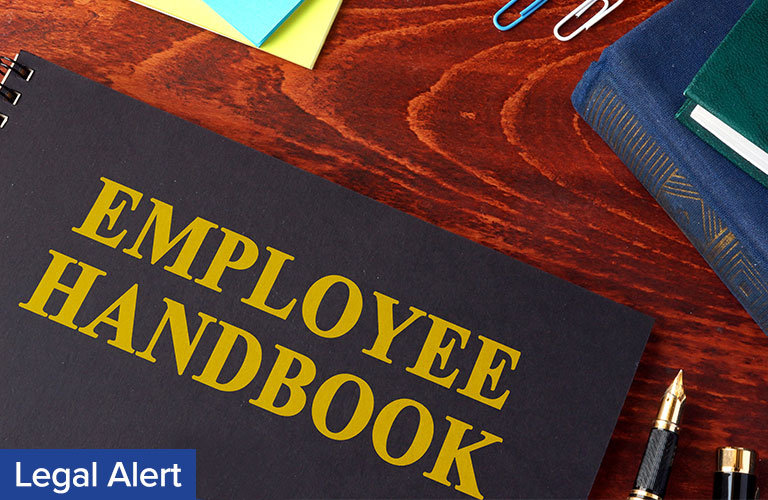
On June 6, 2018, the Office of the General Counsel for the National Labor Relations Board (“NLRB”) released a memorandum of Guidance on Handbook Rules (Memorandum GC 18-04) since its decision in The Boeing Company, 365 NLRB No. 154 (Dec. 14, 2017) created a new standard for workplace handbook policies that balances the employee’s protected concerted activity and the employer’s right to maintain a productive and disciplined workplace.
Boeing shifts the analysis from whether a workplace policy could have a chilling effect on Section 7 rights to whether the policy would have a chilling effect. Boeing applies specifically to the creation and maintenance of the rules and policies, not to the implementation of them, and established three categories: (1) rules that are generally lawful to maintain; (2) rules warranting individualized scrutiny; and (3) rules that are unlawful to maintain.
Category 1: Rules That Are Generally Lawful to Maintain
Even though these rules may infringe on employees’ rights, the NLRB has concluded the infringement is peripheral and is not substantial enough to outweigh the employers’ legitimate and substantial business interests. Included are:
(a) Rules prohibiting uncivil behavior, such as “[b]ehavior that is rude, condescending or otherwise socially unacceptable;”
(b) Rules banning photography or recording;
(c) Rules against insubordination, non-cooperation, or on-the-job conduct that adversely affects operations;
(d) Rules against disruptive behavior;
(e) Rules protecting confidential, proprietary and customer information in documents;
(f) Rules against defamation or misrepresentation;
(g) Rules against using employer logos or intellectual property;
(h) Rules requiring authorization to speak on behalf of the company; and
(i) Rules banning disloyalty, nepotism or self-enrichment.
Category 2: Rules Warranting Individualized Scrutiny
These rules and policies will be decided on a case-by-case determination as to whether the interference with the rights guaranteed by the Section 7 is outweighed by a legitimate justification asserted by the employer. The NLRB’s decision will depend on the context and how an employee would apply the rule in their everyday line of work. Examples of policies include:
(a) Broad conflict-of-interest rules that do not specifically target fraud and self-enrichment;
(b) Confidentiality rules broadly encompassing ‘employer business’ or ‘employee information’ (as opposed to confidentiality rules regarding customer of proprietary information…);
(c) Rules regarding disparagement or criticism of the employer (as opposed to civility rules regarding the disparagement of employees…);
(d) Rules regulating use of the employer’s name (as opposed to rules regulating use of the employer’s logo/trademark…);
(e) Rules generally restricting speaking to the media or third parties (as opposed to rules restricting speaking to the media on the employer’s behalf…);
(f) Rules banning off-duty conduct that might harm the employer (as opposed to rules banning insubordinate or disruptive contact at work…); and
(g) Rules against making false or inaccurate statements (as opposed to rules against making defamatory statements…).
Category 3: Rules That are Unlawful to Maintain
These rules and policies have a serious adverse impact on the rights of employees under Section 7, and thus, no business interest or justification in the policy can overcome the chilling effect. Policies include:
(a) Confidentiality rules regarding wages, benefits, or working conditions, and
(b) Rules against joining outside organizations or voting on matters concerning employer.
Therefore, the Boeing decision shifted the analysis of handbook policies from the broad interpretation of what could chill Section 7 rights to a more narrow interpretation of what would chill Section 7 rights. This grants the employer an opportunity to assess policies from an employee’s standpoint to determine what would realistically impact the employee’s everyday decision making. Furthermore, even if the policy does impact the employee’s Section 7 rights, the policy might still be justified if the employer can show legitimate business interests which outweigh the employee’s Section 7 rights.
The Guidance on Handbook Rules did not outline the effect of the Boeing on rules regarding confidentiality of discipline or arbitration or rules that potentially could limit an employee’s access to the NLRB processes. Employers may submit such rules to the NLRB for an Advice Memorandum.
If you have any questions or concerns on how the NLRB’s guidance memo may impact your business practices or have any other questions please contact your labor and employment counsel at Smith, Gambrell & Russell, LLP.

